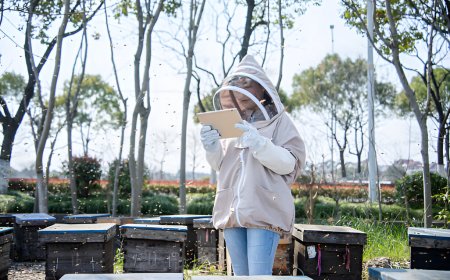Top 10 Emerging Technologies Transforming Daily Life in 2025
Discover the top 10 emerging technologies transforming daily life in 2025, from AI to smart homes. See how innovation saves time and why students search pay someone to do my homework more than ever.

Introduction
As we move deeper into 2025, technology continues to redefine how we live, learn, and work. From smart homes and AI assistants to quantum computing and personalized education, innovations that once seemed futuristic are now woven into our daily routines. These emerging technologies not only enhance convenience but also push the boundaries of what we once believed was possible.
Whether you're a student, professional, or entrepreneur, keeping up with the latest tech trends can give you a serious edge. And if you're overwhelmed by everything happening at once, you’re not alone. Many students, for example, find themselves so busy keeping up with the pace of change that they search for services where they can pay someone to do my homework—freeing up time to focus on mastering these life-changing innovations.
Here are the top 10 emerging technologies in 2025 that are transforming everyday life.
1. Artificial Intelligence (AI) in Daily Applications
AI is no longer just powering chatbots—it’s running our homes, grading assignments, booking appointments, and even writing code. Tools like ChatGPT, Google Gemini, and Copilot are now part of everyday workflows, helping users write emails, draft presentations, and even complete college essays.
Real-world uses:
-
Smart assistants that handle schedules
-
AI-driven customer service bots
-
Personalized shopping and entertainment recommendations
Impact: Time saved, increased productivity, and better decision-making for both students and professionals.
2. Wearable Health Tech
Fitness trackers have evolved into smart health monitors capable of measuring blood oxygen, heart rate variability, stress levels, and even detecting early signs of illness.
Examples:
-
Apple Watch Series 9 with temperature and mood tracking
-
Oura Ring tracking sleep and recovery metrics
-
Smart contact lenses that monitor glucose
Impact: Proactive health management and early diagnosis, especially helpful for people with chronic conditions.
3. 5G and the Rise of 6G Connectivity
5G has made high-speed internet ubiquitous in urban settings, enabling real-time communication, cloud gaming, and virtual collaboration. But in 2025, 6G is already in early rollout stages in several countries.
Benefits:
-
Ultra-low latency
-
Faster downloads and uploads
-
Seamless streaming in AR/VR
Impact: Smoother remote work, better mobile experiences, and the foundation for smart cities.
4. Smart Homes with AI Automation
Your fridge knows when you're low on milk. Your thermostat adjusts based on your preferences. Your home security recognizes familiar faces. In 2025, smart homes are smarter than ever.
Key integrations:
-
Voice-controlled appliances
-
AI-powered home energy optimization
-
IoT sensors syncing devices and systems
Impact: Improved convenience, energy savings, and peace of mind.
5. Augmented and Virtual Reality (AR/VR)
AR and VR have moved beyond gaming into education, therapy, real estate, and training simulations. Meta’s Quest 3 and Apple’s Vision Pro are leading devices offering mixed reality experiences that blend the digital and physical worlds.
Use cases:
-
Immersive classrooms and labs
-
Virtual field trips for students
-
AR shopping and home design previews
Impact: Enhanced learning, creative engagement, and more interactive remote workspaces.
6. Personalized Education Powered by AI
The education system is undergoing a major transformation. Platforms use AI to deliver customized learning experiences, allowing students to learn at their own pace and style.
Examples:
-
Khanmigo (by Khan Academy) for personalized tutoring
-
AI feedback tools that improve writing and comprehension
-
Adaptive testing platforms that tailor difficulty in real-time
Students balancing multiple assignments often turn to digital tools and online services. Many even look for someone they can trust to pay someone to do my homework—not out of laziness, but to prioritize learning over repetitive tasks.
7. Quantum Computing Advancements
While still in its early stages, quantum computing is gaining momentum in solving problems that classical computers can't handle efficiently.
Potential breakthroughs:
-
Drug discovery and molecular modeling
-
Climate simulations
-
Financial modeling and encryption
Impact: Industries like pharmaceuticals, cybersecurity, and finance are preparing for a massive shift in computing power.
8. Green and Sustainable Technology
With climate concerns reaching critical levels, green tech is no longer optional. In 2025, innovations in clean energy, electric vehicles, and smart agriculture are helping reduce our carbon footprint.
Notable trends:
-
AI-powered energy grids
-
Solar panels with improved efficiency
-
EVs with extended battery life and fast-charging networks
Impact: Cleaner cities, more sustainable lifestyles, and eco-conscious consumer behavior.
9. Blockchain for Everyday Transactions
While blockchain is best known for cryptocurrency, it’s now used for much more—identity verification, supply chain tracking, digital voting, and smart contracts.
Real-life uses:
-
Verifying academic credentials
-
Transparent donation tracking
-
Secure digital IDs
Impact: More trust, transparency, and security in digital interactions.
10. AI-Powered Writing and Research Tools
Students in 2025 have access to a range of AI tools that can research, summarize, and even generate essays. While tools like Grammarly and Jasper AI assist with editing, platforms like ChatGPT can help brainstorm ideas or outline complex projects.
However, many students feeling overwhelmed by tight deadlines or multiple assignments are now seeking ways to pay someone to do my homework—not because they can’t learn, but because they want to focus on the skills that matter most for their future careers.
The Human Side: Balancing Tech and Time
Despite these incredible technologies, there’s one resource that remains limited: time. While tech can optimize and automate, managing education, work, and personal growth remains a balancing act.
For students especially, juggling multiple assignments while adapting to new technologies can be exhausting. That’s why online academic support—like professional tutoring or the ability to pay someone to do my homework—has become an essential service. It offers breathing room in a world where everything moves fast.
Conclusion
The year 2025 is a turning point in how we interact with technology. From AI-driven education to smarter homes and greener cities, emerging technologies are streamlining our routines and expanding our capabilities.
While it's exciting to watch innovation unfold, it's also important to stay grounded. Knowing when to embrace tools—whether it’s a smartwatch, a chatbot, or a reliable assignment help service—can make all the difference in how effectively you navigate this new tech-driven world.
So, whether you’re exploring the latest gadgets or trying to free up time by choosing to pay someone to do my homework, the key is using technology to enhance—not replace—your goals.
















































































